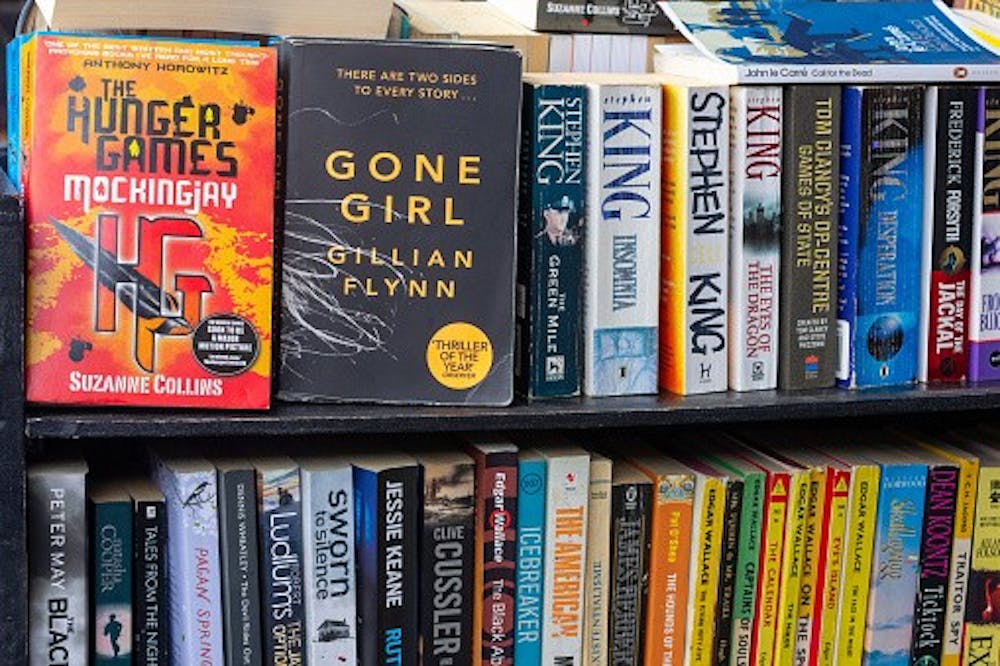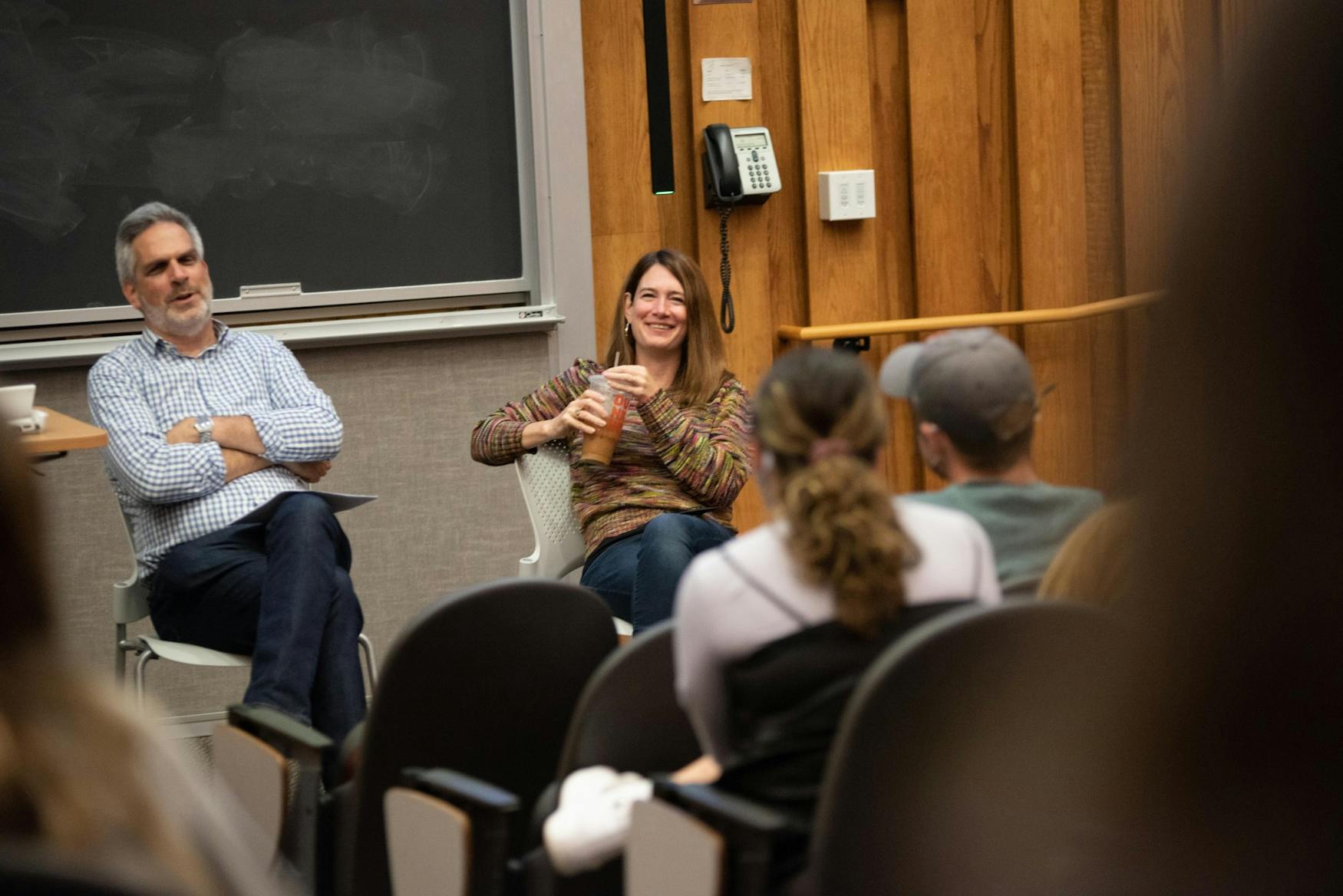Gillian Flynn on Thinking, Writing and Amorality
The “Gone Girl” author and expert in mystery visited Brandeis to speak on her experiences as a journalist, author and producer.
Like her infamous protagonist Amy Dunne, Gillian Flynn knows how to grip a crowd. Flynn, the journalist-turned-novelist of “Gone Girl,” “Sharp Objects” and “Dark Places,” visited Brandeis on Oct. 12 in conversation with Prof. Josh Wolk (JOUR). Wolk, like Flynn, has also worked as a journalist — he found success at Vulture, among other magazines and news sites.
In contrast to how dark Flynn’s bestselling thrillers are, the atmosphere of the event was overwhelmingly cheerful. Flynn interspersed her discussion with humorous quips about her life, including an anecdote about working a comically-miserable mall job as a giant walking yogurt cone.
The sense of humor she exhibited in her talk can also be found in her books. “I think that most of my characters — my primary characters at least — have a sense of humor … Otherwise getting through [my books] would be hard,” Flynn said.
Flynn described always having an interest in the macabre, which her father in particular fostered through his own love of movies. He’d frequently take Flynn to local horror showings in their hometown of Kansas City. “They were sometimes wildly inappropriate for a nine-year-old … like ‘The Elephant Man’! Don’t show that to a child! … Whether it was good or bad, on the walk home, we would talk about it. He would never let me get away with ‘I liked it,’ you know? It would always be, ‘Well, what did you like about it? What did you dislike about it?’ I mean, even then I was being asked to justify my thoughts and opinions,” Flynn said.
After writing for Entertainment Weekly for 10 years, Flynn published her debut novel “Sharp Objects” in 2006, followed by “Dark Places” in 2009. Her instant bestseller “Gone Girl” flooded bookshelves in 2012 and then theaters in 2014. In recent years, Flynn worked as a producer on HBO’s TV adaptation of “Sharp Objects” and she was the showrunner and writer of Amazon’s “Utopia.”

BOOK: Flynn’s “Gone Girl”was a crime thriller and New York Times bestseller.
Flynn has been criticized for her depiction of women in her books, particularly in “Gone Girl”. Some claim she portrays them as contrived and predictable, using looks or status to take advantage of those around them. “Gone Girl”’s anti-heroine Amy Dunne fakes her own death, frames her cheating husband for it and becomes the subject of a national media obsession that one might now refer to as a perfect fictional example of “missing white woman syndrome.” After manipulating her friends, family and the entire nation into believing her husband is guilty of murder, Dunne dramatically and publicly returns to deliver a final blow: she frames another man for “kidnapping” her and manipulates her husband into staying with her forever. Cue the backlash.
In response to accusations of misogynistic writing from critics, Flynn has said that she seeks to expand the definition of what it means to be a female villain. But what about villainy outside of fiction? Many journalistic profiles — a large part of Flynn’s past work at EW — tend to portray multidimensional people through specific angles or themes, and thus don’t always have the room for the kind of complex amorality that Flynn has been credited for using in her fiction. “It’s easier to do when you have the swath of a novel,” Flynn said. “Those [amoral characters] are particularly hard to do, but they’re the kinds of stories, articles and books that people talk about because they want to discuss how they felt. It’s much more fun to debate the looseness of something. And I think that’s a large reason why ‘Gone Girl’ sold well.”
Similarly, Flynn described her success in writing as being rooted in a process of thinking and analyzing the media you consume. “I am consistently stunned by people who say they want to be a screenwriter or a writer and you know, you ask them what they’re really into and they don’t have that answer,” Flynn said. “You know, to me, that is so key … There is no such thing as a waste of time watching a movie or reading a book as long as your brain is working, and you’re thinking about why something is working or not working.”
Fans of Flynn’s have something to look forward to — she has signed on to work as a publisher for Zando, an independent publishing company that will enlist Flynn to seek out newly written works. At Zando, Flynn has begun a new sub-publishing project, “Gillian Flynn Books.” “Gillian Flynn Books will nurture writers who are surprising and unique … I want to help big and new voices find their way in the world. Launching my imprint with Zando means I get to do that,” Flynn wrote on Zando’s website.
As for a new book by Flynn? That remains unclear.
“I’ll be back,” Flynn said as she exited the room at the end of her talk.
“Or will I?”



Please note All comments are eligible for publication in The Justice.